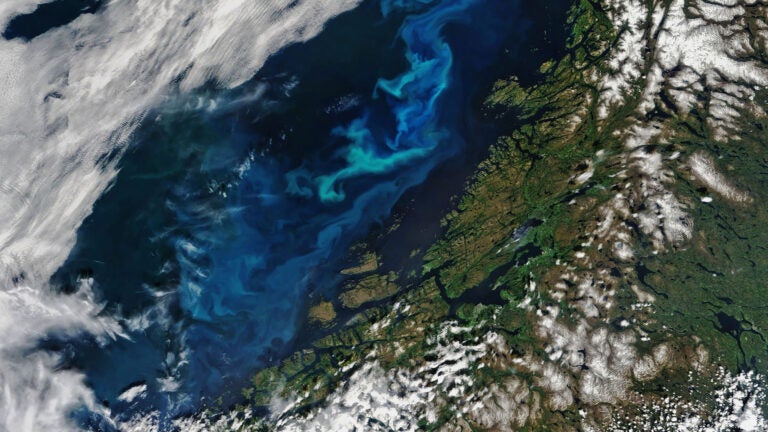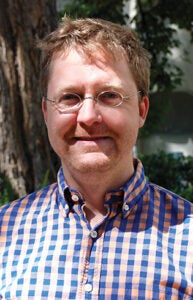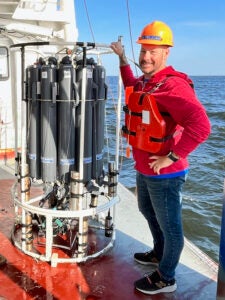
Three USC Dornsife faculty members named 2023 Simons Investigators
Three marine scientists at the USC Dornsife College of Letters, Arts and Sciences were among seven distinguished scholars to receive the 2023 Simons Investigator in Aquatic Microbial Ecology Award.
The program supports “outstanding investigators in the field of microbial ecology in marine or natural freshwater systems, who will advance our understanding through field studies, laboratory experiments, modeling or theory.”
Granted to Associate Professors Naomi Levine, Seth John and J. Cameron Thrash and totaling $4.7 million, the awards will enable them to expand their current research and open avenues to new investigations. The funding covers salary support for the investigators and their lab personnel, equipment, travel, publications and other research expenses.
Strategic adaptation

Levine, associate professor of biological sciences, quantitative and computational biology and Earth sciences, received $1.75 million to highlight how microbial interactions affect the way phytoplankton respond and adapt to environmental changes. Through her project, titled “With a little help from my friends: phycosphere plasticity as a potential adaptation strategy,” she will combine numerical modeling with field and laboratory studies to understand how the microbes adapt to changing conditions.
One of the great challenges in biological oceanography is to understand how human-driven changes in climate alter microbial dynamics and subsequently ocean biogeochemical cycling. Research indicates future changes in climate will generate novel environmental conditions with multiple environmental variables changing simultaneously. This project will investigate how microbial interactions might shift as the climate changes.
Levine will incorporate two newly developed microfluidic technologies to study microbial interactions in the lab and field. These findings will be integrated into numerical models to predict the impact on biogeochemical cycling.
Elucidating the mechanisms of marine microbial adaptation is crucial to understanding and predicting changes to how carbon moves through global ecosystems, which directly impacts climate change and other factors affecting life throughout the planet.
Tracing trace metals

John, associate professor of Earth sciences, received $1.75 million to continue his research exploring the importance of trace metals on phytoplankton ecology. His project, “In plasticus, in silico, in situ: Culturing, models, and observations combined to explore the impacts of trace-metals on marine ecology,” uses a blended approach to address a long-standing idea in marine ecology: that trace-metals impact phytoplankton community structure and ecology, even in regions of the ocean where no obvious single trace-metal nutrient exists.
He’ll measure the relative amounts of various trace metal nutrients that different phytoplankton types can consume and at what point the microbes become starved for different metals. He’ll also use stable isotopes of the metals to understand where they travel within the organisms.
Computer-generated experiments will provide the framework for developing these experiments, which will culminate in large-scale studies in controlled, natural environments. The studies will shed light on the effect of trace-metals within diverse microbial communities and enable researchers to understand their impact — past, present and future — on the world’s oceans.
Carbon cycling and climate change

Thrash, associate professor of biological sciences, received $1.2 million to study “Coastal SAR11 in a Changing Climate.”
Marine microbes called bacterioplankton are dominated by a group called SAR11 that are abundant in coastal marine communities as well as estuaries, where fresh water from rivers or streams mixes with ocean water. As sea levels rise due to climate change, the relative abundance of different subgroups of SAR11 bacterioplankton should shift depending on their varying tolerances for salt levels.
Thrash will study how these shifts will affect the uptake and processing of carbon by these SAR11 bacterioplankton. His methods will include genome-enabled investigation of SAR11 metabolism coupled with measuring metabolic rates as well as experimental evolution to “future cast” SAR11 adaptation in changing conditions.